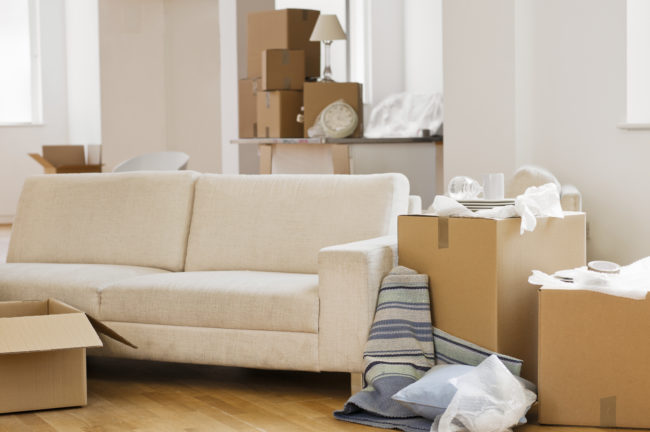After a fun-filled day of moving with the professionals at Moving Kings, you are most likely waking up to a house full of boxes feeling like you ran a marathon. The hard part of physically moving is over, but unpacking can be very daunting. Moving Kings has developed ten helpful tips to make settling in to your new home a breeze.
1. Take Care Of Your Body
Moving is a very physically demanding activity. It is important to stretch and stay hydrated before, during, and after the move. Make sure you give your body time to rest and heal by unpacking a little bit at a time. Try not to do any heavy lifting that may put more strain on your body, and don’t forget about any daily medications.
2. Eat Healthy
With your dishes and utensils still packed away, you may find yourself ordering a lot of take out and delivery food. While this is a good idea during and directly after the move, it’s important to get back to a healthy diet as soon as you can. It is especially important if you are sore or in pain after the move. Having a well-balanced diet will help alleviate some stress and anxiety and give you more energy to get through the unpacking phase.
3. Learn Your Home
It’s a good idea to do a thorough inspection of your home before you start decorating. Look for:
- The fuse box
- The air conditioning unit
- Any leaking pipes
- Any damage
- Any signs of pest infestation
4. Help Your Pets Adjust
Some pets acclimate to new environments very quickly, while others need a period of adjustment. Your pet will not entirely understand what happened and there will be lots of new smells and places to explore. Don’t be surprised if your fully trained pet starts urinating in your new house; they are marking their newly claimed territory. For more nervous animals, it can be helpful to fill their new sleeping area or playroom with toys and familiar smells to help them adjust. Make sure to reward your pet for good behavior and exploring with plenty of treats, encouragement, and belly rubs.
5. Get Outside
After all the cleaning, packing, and now unpacking, it is important to stay grounded by taking a walk and getting some fresh air. Try planning a family walk to the local park so you can all start to learn the area. This is also a great way to meet some locals in the area and a chance for your children to make some new neighborhood friends.
6. Drive Around Town
If you start feeling the symptoms of cabin fever after hours of unpacking, take an hour or so for a relaxing drive around your new community. Set the GPS destination to your local post office, mall, grocery store, and school to start learning the streets and traffic patterns of the area. Stay calm and be patient with yourself when navigating a new area. You’ll become familiar with the directions in time — don’t stress over trying to find your way out of your new Wal-Mart parking lot.
7. Meet The Neighbors
Just like wild animals, they are more scared of you than you are of them! Everyone has the sinking feeling that their new neighbors will be a family of obnoxious musicians who plan on having all-night rock concerts in the garage. Take the time to go to each of your direct neighbors and introduce yourself and your family. Reassure them that you want to create a long, lasting friendship and hold each other accountable as neighbors to help out in the event of an emergency. Ask them for recommendations on cool things to do or great places to eat. If you are really feeling bold, invite them out to dinner at one of their recommended restaurants or offer to host them for wine and cheese.
8. Learn Emergency and Evacuation Procedures
Every area has a course of action in the event of a natural catastrophe or emergency. It is best to check with your local government to find out what direct dangers pose a threat to your family and home, whether it’s flooding, earthquakes, or more. Learn the proper evacuation routes, the location of local shelters, and a list of gas stations that run on backup generators. You should also make an emergency preparedness kit. The best Plan A has a Plan B, and it is never too soon to implement an Emergency Preparedness Plan for you and your family.
9. Finalize Your Address Change
Double check your list and make sure you’ve notified the DMV, the post office, your bank, and other important institutions of your new change of address. Some companies may require you send them a utility bill or a First Class piece of mail with your name and new address as proof. Make sure you stay on top of this so there is no lapse of information. A great idea is to go paperless for services like banking and change your address information via your online account. If it’s not too far, you may want to swing by your old residence to look for any mail not forwarded to your new address after the move. Don’t forget to update your Amazon account if you are a fan of “one-click buy.”
10. Unpack
There is no way around it: you are going to have to unpack all those boxes, put the items in their proper place, and break down the boxes for recycling. The best advice we can give is to focus on one area at a time. If you are feeling overwhelmed by the mountain of boxes, take three or four to a separate area and focus on unpacking and breaking down those boxes first. Unpacking is a marathon, not a sprint. Rome was not built in a day, and chances are you will not be fully unpacked in a day. Take your time and don’t get stressed if you can’t find something right away. There is no shame in labeling new cabinets and drawers with notes to describe what’s inside while you learn where everything is located in your new home.
We hope these tips and pointers help minimize the stress that comes with unpacking. If you’re planning ahead, make sure you also check our tips for the month leading up to your move and for the day before our team arrives. Remember that our moving professionals are here to help you every step of the way, even after everything has already been moved into your new home. Don’t hesitate to give Moving Kings a call or shoot us an email with any post-move questions or concerns.






